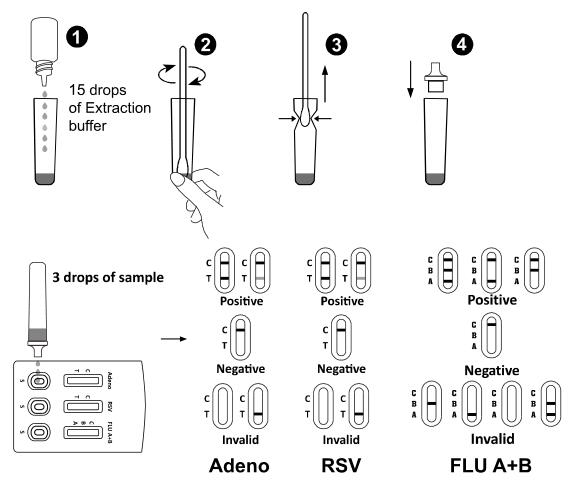Description
【SUMMARY】
Although there are a variety of viruses that can cause infections in the lower respiratory tract in children and adults, Influenza A + B, respiratory syncytial virus (RSV), influenza for 1, 2 and 3 and Adenovirus are often the most common. Symptoms of respiratory disease caused by Adenovirus includes from the common cold to pneumonia, ''croup'', and bronchitis. There are 47 serotype of Adenovirus, causing different disease from conjunctivitis, bronchitis, pneumonia, diarrhea and other symptoms. Among them, the serotypes of 8, 14, 16,and 17 have been shown to cause conjunctivitis, while serotypes 7, 14, 21 cause respiratory symptoms. The antibodies used in the current test kit has a wide range of reactivity against many serotypes of adenovirus, including serotypes of 1, 2, 3, 4, 5, 6, 7, 8, 11, 14, 16, 17, 19 and 37.
Respiratory Syncytial Virus (RSV), which causes infection of the lungs and breathing passages, is a major cause of respiratory illness in young children. In adults, it may only produce symptoms of a common cold, such as a stuffy or runny nose, sore throat, mild headache, cough, fever, and a general feeling of being ill. But in premature babies and kids with diseases that affect the lungs, heart, or immune system, RSV infections can lead to other more serious illnesses. 1 RSV is highly contagious and can be spread through droplets containing the virus when someone coughs or sneezes. It also can live on surfaces (such as countertops or doorknobs) and on hands and clothing, so it can be easily spread when a person touches something contaminated. RSV can spread rapidly through schools and childcare centers. Babies often get it when older kids carry the virus home from school and pass it to them. Almost all kids are infected with RSV at least once by the time they're 2-3 years old. RSV infections often occur in epidemics that last from late fall through early spring. Respiratory illness caused by RSV — such as bronchiolitis or pneumonia — usually lasts about a week, but some cases may last several weeks. Influenza (commonly known as ‘flu’) is a highly contagious, acute viral infection of the respiratory tract. It is a communicable disease easily transmitted through the coughing and sneezing of aerosolized droplets containing live virus. 3 Influenza outbreaks occur each year during the fall and winter months. Type A viruses are typically more prevalent than type B viruses and are associated with most serious influenza epidemics, while type B infections are usually milder.
The gold standard of laboratory diagnosis is 14-day cell culture with one of a variety of cell lines that can support the growth of influenza virus. Cell culture has limited clinical utility, as results are obtained too late in the clinical course for effective patient intervention. Reverse Transcriptase Polymerase Chain Reaction (RT-PCR) is a newer method that is generally more sensitive than culture with improved detection rates over culture of 2-23%. 5 However, RT-PCR is expensive, complex and must be performed in specialized laboratories.
The Adenovirus / RSV / Influenza A+B Combo Rapid Test cassette (Nasopharyngeal Swab) qualitatively detects the presence of Adenovirus,Respiratory Syncytial Virus,Influenza A and B antigens in Nasopharyngeal Swab specimens, providing results within 15 minutes. The test uses antibodies specific for Adenovirus, Respiratory Syncytial Virus, Influenza A and B to selectively detect Adenovirus, Respiratory Syncytial Virus, Influenza A and B antigens in Nasopharyngeal Swab specimens.
【DIRECTIONS FOR USE】
Allow the test, specimen, extraction buffer to equilibrate to room temperature (15-30°C) prior to testing.
1. Remove the test cassette from the sealed foil pouch and use it as soon as possible. Best results will be obtained if the assay is performed immediately after opening the foil pouch.
2. Place the Extraction Tube in the workstation. Hold the extraction reagent bottle upside down vertically. Squeeze the bottle and let the solution drop into the extraction tube freely without touching the edge of the tube. Add 15 drops of solution (Approx. 500μl) to the Extraction Tube. See illustration 1.
3. Place the swab specimen in the Extraction Tube. Rotate the swab for approximately 10 seconds
while pressing the head against the inside of the tube. See illustration 2.
4. Remove the swab while squeezing the swab head against the inside of the Extraction Tube as you remove it to expel as much liquid as possible from the swab. Discard the swab in accordance with your biohazard waste disposal protocol. See illustration 3.
5. Fit the dropper tip on top of the extraction tube. Place the test cassette on a clean and level surface. See illustration 4
6. Add 3 drops of the solution (approx.120μl) to each sample well and then start the timer. Read the result at 15 minutes. Do not interpret the result after 20 minutes.

|
Cat. No.
|
Product Description
|
Specimen
|
Format
|
Kit Size
|
Cut-Off
|
Status
|
|
IARI-535
|
Adenovirus, RSV and Influenza A+B Combo Rapid Test Cassette
|
Nasopharyngeal Swab
|
Cassette
|
10 T
|
See Insert
|
CE
|
More detail about Setia Scientific Solution

 Malaysia
Malaysia